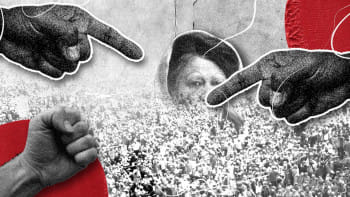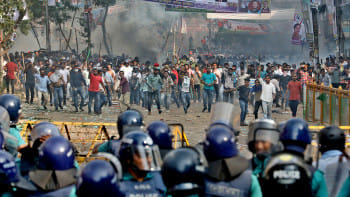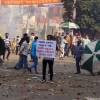BNP's options after the Oct 28 rally

In my last column preceding BNP's October 28 rally, I said that the day would be important for both the main opposition and the ruling Awami League, and the party getting the upper hand in the rally would be ahead in the upcoming general election. After the rally, it became crystal clear that the ruling party got the upper hand, while the opposition faced a setback as it had not been prepared for the violence that unfolded on the day, driving the BNP members away from the rally venue. There is no doubt that the country is heading towards a long-drawn confrontational politics ahead of the election. True, the rival camps were already at loggerheads, but the situation just worsened after the fateful rally.
Let's look at the opposition camp first. BNP, which has remained out of power for 17 years, has been holding rallies and road marches in Dhaka and around the country peacefully as part of its anti-government campaign for the last one and a half years, drawing increasingly large crowds. Until the grand rally in Nayapaltan, Dhaka on October 28, the party was successful in keeping its street programmes peaceful—despite provocative rhetoric from some AL leaders and non-cooperation from the law enforcers. Throughout the non-violent movement, BNP was also able to distance itself from the violent street programmes that it had launched before the 2014 election. At the time, the party faced severe criticism at home and abroad for mindless violence and arson attacks, killing and injuring many, to foil the election. However, throughout its current movement, BNP high-ups announced their street agitation programmes very carefully, and were able to keep their activists in check during demonstrations.
But it suffered a setback as the October 28 rally suddenly turned violent, leaving a policeman and a BNP leader dead, and injuring scores more, as campaigners clashed with the police. The day also saw a return of vandalism and arson attacks on vehicles. Could this violence have been averted? I think it most certainly could have. BNP leaders should have had more of the restraint and patience that they had shown earlier. Media reports said BNP men attacked AL activists, and then police and the Awami League men went on to disperse the BNP members from the rally. The police's role was questionable from the beginning, since they were instrumental in barring thousands of BNP activists from entering Dhaka to attend the rally.
This violence triggered BNP to go for the typical hartals and blockades. Many of the party leaders said they had no option but to toughen up their programmes as their peaceful rallies had not been effective. The government did not pay heed to their demands at all, so it was inevitable that at one point BNP would have to employ tougher measures such as general strikes and blockades to bring life to a halt. But it had intended to do that much later, if at all; what happened on October 28 forced its hand. Regardless, given how the current regime has everything under its iron-fisted control, BNP's chances of success in having its demands realised appear to be very slim.
The more interesting point concerns Jamaat-e-Islami. It did not get permission to hold a rally. The media reported that police would be very tough if Jamaat made any such attempts. But we saw that Jamaat held it peacefully and police did not obstruct it. Why Jamaat was allowed to have a rally is not clear. True, Jamaat is not a banned political party. But how were they allowed to hold it without permission? The curious case of Jamaat may answer many questions regarding BNP's violent rally.
The ruling Awami League is upbeat after the rally. Although very few ruling party members took to the streets on the rally day, they were there carrying sticks. Police and the ruling party men were on the streets to contain the BNP and Jamaat. But then, that is not quite the role of the ruling party men, is it? One must ask: who gave the AL men the authority to guard the streets with sticks? If they have to take to the streets to protect public property, what are the police supposed to do? This trend is nothing new in Bangladesh's politics, though; it seems to have become the norm.
One can assume that after the October 28 rally, the ruling party is feeling relieved about the upcoming election, and will possibly be unchallenged in the battle for the ballot. BNP has been saying that it will not take part in the election if it is held under the current regime, but the way BNP is cornered with most of its senior leaders on the run or in custody, it is almost impossible for the party to join the polls anyway.
Awami League General Secretary Obaidul Quader has warned the BNP against tough programmes. Referring to what happened at Shapla Chattar in Dhaka on May 5, 2013, he said the consequences would be far worse for the BNP. Addressing a massive rally of AL's youth wing at Bangabandhu Avenue on Monday afternoon, he said, "What happened at Shapla Chattar that night? Didn't they flee? Didn't they run away? I do not want to say it, but BNP will have a more tragic end. Sheikh Hasina does not bow down and fears no one except Allah."
It is unfortunate for a nation that it could not devise an election strategy that would ensure a safe and peaceful transfer of power and ensure people's voting rights after five decades of independence. It's a matter of shame for us, and our politicians are to blame for this. Many people asked me who won in the October 28 rally. In reply, I said no matter who won, it's the people who lost.
Mohammad Al-Masum Molla is chief reporter at The Daily Star.
Views expressed in this article are the author's own.
Follow The Daily Star Opinion on Facebook for the latest opinions, commentaries and analyses by experts and professionals. To contribute your article or letter to The Daily Star Opinion, see our guidelines for submission.

 For all latest news, follow The Daily Star's Google News channel.
For all latest news, follow The Daily Star's Google News channel. 









Comments